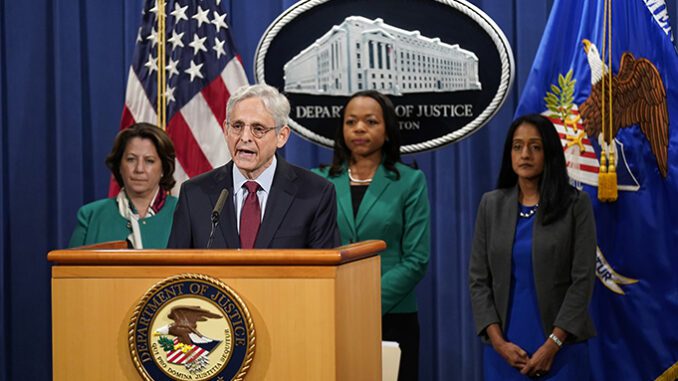
WASHINGTON, D.C. — The Justice Department is suing Georgia over the state’s new election law, alleging Republican state lawmakers rushed through a sweeping overhaul with an intent to deny black voters equal access to the ballot.
“Where we believe the civil rights of Americans have been violated, we will not hesitate to act,” Attorney General Merrick Garland said in announcing the lawsuit.
Republican lawmakers in the state pushed back immediately, pledging a forceful defense of Georgia’s law.
The Biden administration’s move comes two weeks after Garland said his department would scrutinize new laws in Republican-controlled states that tighten voting rules. He said the federal government would take action if prosecutors found unlawful activity.
The suit also comes as progressive pressure grows on the Biden administration to respond to GOP-backed laws being pushed in the states this year.
As of mid-May, 22 election integrity laws had passed in at least 14 states, according to the left-leaning Brennan Center for Justice, which advocates for loosening voting laws. Justice Department officials hinted that prosecutors were looking at other voting laws across the United States and warned that the government would not stand by if there were illegal attempts to restrict voter access.
The increased enforcement of voting rights laws also signals that President Joe Biden and Assistant Attorney General Kristen Clarke are making good on a promise to refocus the department around civil rights. Clarke was one of the nation’s leading civil rights attorneys before her nomination to lead the department’s civil rights division.
Georgia’s secretary of state, Brad Raffensperger, said he would contest the suit. The Republican official was harshly criticized by then-President Donald Trump and his allies for rebuffing efforts to challenge the outcome of the state’s vote in the 2020 election. Raffensperger largely supported the new law and faces a primary challenge from a congressman backed by Trump.
“The Biden Administration has been spreading lies about Georgia’s election law for months,” Raffensperger said in a statement. “It is no surprise that they would operationalize their lies with the full force of the federal government. I look forward to meeting them, and beating them, in court.”
Gov. Brian Kemp, R-Ga., called the Justice Department’s lawsuit “legally and constitutionally dead wrong” and said the accusations made by prosecutors were baseless and “quite honestly, disgusting.”
“Today, the Biden Justice Department launched a politically motivated assault on the rule of law and our democracy,” he said at a news conference.
The bill, known as SB 202, adds a voter ID requirement for mail ballots, shortens the time period for requesting a mailed ballot and results in fewer ballot drop boxes available in some areas — provisions that will be challenged by the federal government.
“The changes to absentee voting were not made in a vacuum,” Clarke said. “These changes come immediately after successful absentee voting in the 2020 election cycle, especially among black voters. SB 202 seeks to halt and reverse this progress.”
The lawsuit also takes aim at another controversial measure — a ban on the distribution of food and water by various groups and organizations to voters standing in line to cast a ballot. Democrats say the support is needed to encourage voters who find themselves in long lines. Republicans argue the measure is needed to prevent unlawful electioneering from happening at polling places.
In 2020, just two states had ID requirements for voters requesting a mailed ballot. Along with Georgia, lawmakers in Florida have also passed a law requiring additional identification for mail voting. Clarke described the Georgia law as adding “new and unnecessarily stringent” identification requirements to mail voting.
In Georgia, drop boxes were permitted last year under an emergency rule prompted by the coronavirus pandemic. State Republicans have defended the new law as making drop boxes a permanent option for voters and requiring all counties to have at least one.
The NAACP and activists such as Stacey Abrams applauded the administration’s step. NAACP President Derrick Johnson said Georgia’s law was a “blatant assault on the American people’s most fundamental and sacred right, the right to vote.”
The law already is the subject of seven other federal suits filed by civil rights and election integrity groups that raise a number of claims under the Constitution and the Voting Rights Act, which prohibits discrimination in voting.
The Supreme Court also is weighing a voting rights dispute from Arizona that predates last year’s election in which the court could again significantly cut back on the use of the voting rights law.




